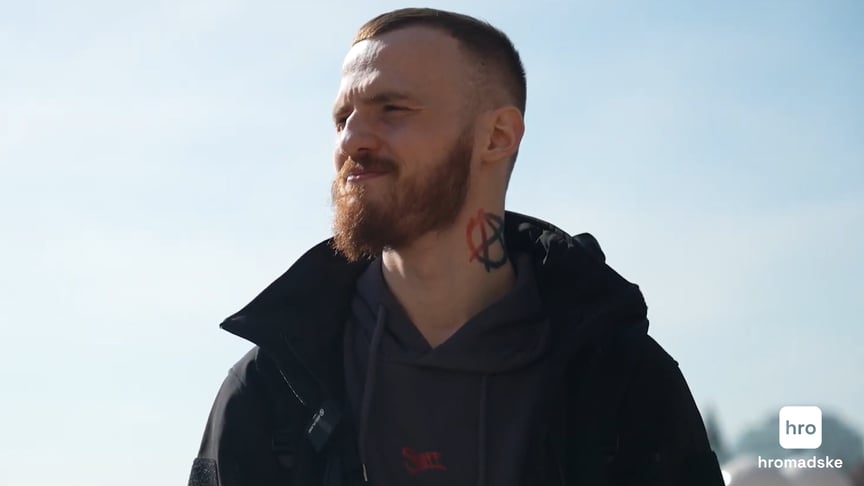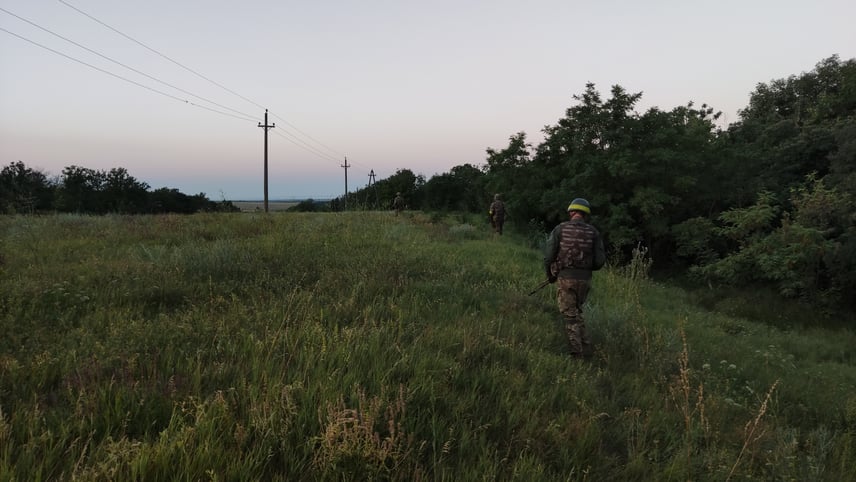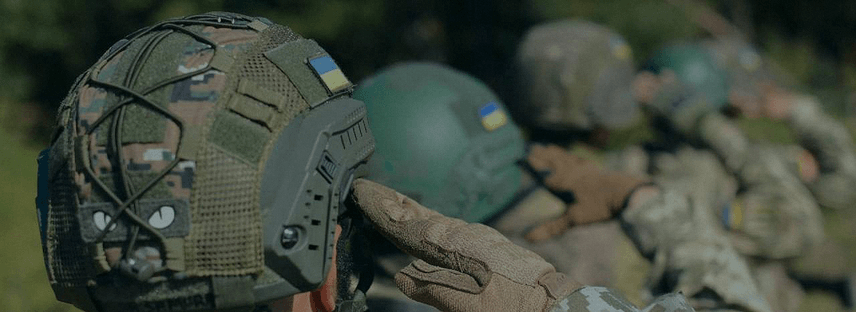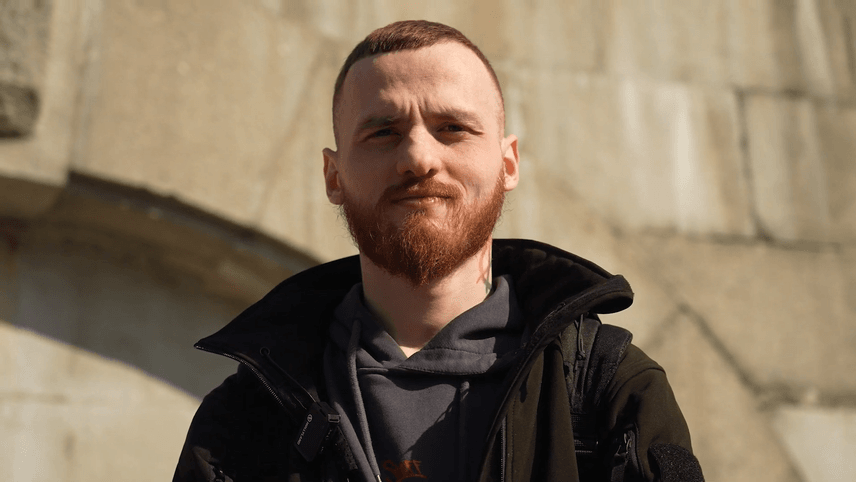Fighting for Ukraine: The struggles of foreign volunteers in the Armed Forces

Emiliy Labeyka faces up to 10 years in prison in his home country. He fled Belarus after participating in student protests against the Lukashenko regime. He became not only a political exile but an internal one as well — none of his large family supported him: not his parents, not his two brothers, not his two sisters, not even his wife at the time.
While in Poland, at the age of 21, he decided to join the ranks of Belarusian volunteers and fight for Ukraine. He mustered the courage to call his father. He still vividly remembers that day — March 29, 2022.
“I called him and said, ‘Hello, Dad, here’s the deal… I’m on a train from Gdańsk to Warsaw right now. And then I’m heading to Ukraine to fight in the war.’ He said, ‘Are you f***ing crazy? What the hell are you doing there?!’”
“I just wanted my parents to at least know where I ended my life, in case something happened.”
Emiliy served nearly three years in the Kalinouski Regiment as part of the International Legion until he was recently discharged due to health issues. On the Donetsk front, he lost his passport, so in conversation, he repeatedly says, “I’m a nobody here.” Legalizing his status in Ukraine, he says, is practically impossible.
How many foreign volunteers are in the Ukrainian Armed Forces, what is their legal status, and what does Ukraine provide them? What about payments, social guarantees, and citizenship? And what happens in the event of their death? Learn more in this hromadske report.
“The military recruiters stopped me, and I said, ‘I’m Belarusian, actually’”
For being from Bobruisk, Emil earned the call sign “Bobr” (‘Beaver’). After his first battle in Kherson Oblast, when a tank fired at him and the shell miraculously didn’t explode, he became known as the “anti-tank Bobr.”
A year later, after fighting in Bakhmut and suffering several concussions, he began experiencing gastrointestinal issues. He managed to keep going on medication for another year and a half, despite being diagnosed with Crohn’s disease and irritable bowel syndrome. But the Military Medical Commission never acknowledged that he lost his health during service.
He was discharged from the International Legion only recently. Now, he has neither a passport nor a military ID.
Right now, I’m, like, a nobody here. In practical terms, I can’t open a bank account, get a driver’s license, or even go to a hospital and sign up with a general practitioner. I’m being treated by one kind-hearted doctor.Emiliy Labeyka, volunteer from Belarus
“Even as a soldier, Belarusians aren’t always admitted to hospitals. I remember in 2022, after a concussion, we ended up in some hospital, and they had to negotiate at higher levels, like, ‘There’s a Belarusian volunteer from near Bakhmut, concussed, you need to take him in…’”
Applying for Ukrainian citizenship is even more out of reach for Emil.
“Getting Ukrainian citizenship is a whole separate, very complicated issue. Or maybe it’s just like that for Belarusians… There are mechanisms in place, but they’re very selective and dragged out over time. Some manage to get citizenship, but that’s more the exception than the rule. Many volunteers remain without a passport or official status for years. I can’t apply for citizenship right now, again, because ‘we can’t do anything without a passport.’”
The most absurd thing, he says with a laugh, is when he’s stopped on the street by Territorial Recruitment and Social Support Center officers asking for his documents.
“And I tell them I don’t have any documents. I’m Belarusian, actually… But I showed them a scan of my passport, they checked me in their database, and let me go.”
Rights of foreign volunteers
There have been cases where foreigners are mobilized. For example, according to a case in the state registry, this happened to a Moldovan citizen. He ended up serving for two years, but when he wanted to be discharged, his military unit refused, claiming no contract had been signed with him — even though this should have been mandatory for foreigners.
The appellate court ultimately clarified the matter: military duty does not apply to foreigners in Ukraine. But the legal battle lasted nearly a year.
“Such cases with foreigners are rare, but as this case shows, they do happen. I’ll emphasize: even if, for some reason, a contract wasn’t signed with a foreigner upon joining the Ukrainian Armed Forces, according to current legislation, they still have the right to be discharged. No one can force foreigners to serve in the Ukrainian Armed Forces against their will,” says lawyer Yevhen Fylypets.
According to the law “On Military Duty and Military Service,” foreign volunteers can serve only under a contract. They can sign it with the International Legion or other Ukrainian Armed Forces units. Previously, contracts could be terminated almost immediately. Now, termination is possible only after six months of continuous service.

Still, the percentage of foreigners in the Ukrainian Armed Forces has significantly increased, says Kostiantyn Milevskyi, an officer in the Department for Coordination of Foreigners’ Military Service in the Ukrainian Armed Forces, in an interview with hromadske. This is partly because the Foreign Recruitment Center is now fully operational, and the state has begun covering foreigners’ travel expenses to Ukraine.
At the start of the full-scale invasion, 100-150 foreigners joined the Ukrainian Armed Forces monthly, but now that number is around 600. As of now, over 8,000 foreign volunteers have joined Land Forces units, says Milevskyi. He doesn’t rule out that the figure is likely at least twice as high when considering all branches of the Armed Forces.
In the Ukrainian Armed Forces, based on our data, people from 72 countries are serving. As of now, about 40% are exclusively from South America.Kostiantyn Milevskyi, officer of the coordination department for military service by foreigners in the Armed Forces of Ukraine
Support and social guarantees for foreigners are on the same level as for Ukrainian citizens, Milevskyi assures.
“I say it everywhere: all foreigners who decide to join the Ukrainian Armed Forces are, from the moment they sign a contract, servicemembers of the Armed Forces. They receive the same salary and additional payments as we do. Social, legal, and material support — everything is absolutely identical.”
Families of the missing persons are flooding us with requests
In practice, however, the lawyer says foreign volunteers and their families still face issues with both legalization and social support. The process of supporting families in the event of a volunteer’s death is also legally complex.
“One significant case from our practice involves the family of a deceased foreign serviceman. Their family is entitled to a one-time financial assistance payment, just like Ukrainian citizens — 15 million hryvnias ($363,372). But given the complex procedure for submitting documents and the organizational and logistical difficulties, such cases are extremely complicated and can drag on for a year,” adds lawyer Fylypets.
Kostiantyn Milevskyi acknowledges: “There are problematic issues. Because we’ve never had foreigners serving in such numbers. We’ve never provided such extensive services, including social support, to these people.”
If a foreigner dies, a family member or authorized representative must come to Ukraine, including to open bank accounts for payments at a state bank.
“Unfortunately, some processes require physical presence. But believe me: there used to be far more of these processes. And commanders didn’t even know what to do when, for example, the family of a missing person reached out.
We knocked on every possible door, and thanks to changes in legislation, the process for submitting documents has been simplified as much as possible. The military unit consults, helps with paperwork, and sends families sample reports. But these processes do take a bit longer,” the officer notes.

Another problematic issue is Russian psyops [information-psychological operations]. Families [of the deceased] are sent various videos and messages claiming he’s a traitor, a Nazi… Families are flooding us with requests and phone calls.Kostiantyn Milevskyi, officer of the coordination department for military service by foreigners in the Armed Forces of Ukraine
“I completely understand the families: they want to know right this second where their child is. But there are certain procedures we simply cannot bypass. We ask them to submit an official request through the embassy, which then forwards it to the Ministry of Defense… We receive the request, process it, and provide a response.”
The number of foreigners killed or missing in action in the Ukrainian Armed Forces is not disclosed. “But that number is very small,” Milevskyi assures.
Focus on Russians and Belarusians?
Last year, parliament passed a law on the legal status of foreign volunteers, allowing them to apply for Ukrainian citizenship even with expired passports. This was because “if they return home, they face prison terms or even the death penalty.” Family members of volunteers were also granted the right to obtain a residence permit.
The procedure for obtaining citizenship for foreigners was further simplified with the recently adopted law on multiple citizenship. For this, volunteer servicemembers will need to serve under a contract for just one year, instead of three as was previously required. Milevskyi acknowledges that these amendments primarily address the legalization issues faced by Russian and Belarusian volunteers.
“In 95% of cases, yes, this will apply exclusively to them. Because for someone from another country, getting a new passport if theirs has expired is not a problem.”
For Russian and Belarusian citizens, losing and renewing any documents or legalizing their status in Ukraine is currently a huge problem. And since citizenship is granted solely by presidential decision… By the time that document reaches the president’s desk for signing, it will have gone through seven circles of hell, checked inside and out, and problematic issues will arise.Kostiantyn Milevskyi, officer of the coordination department for military service by foreigners in the Armed Forces of Ukraine
The Ukrainian Armed Forces acknowledge that the issue of what to do if a passport is lost remains unresolved.
“Foreigners reach out to us, and this problem, unfortunately, exists. We constantly write letters: provide them with clarification, help, and so on. But not everyone gets help. And how quickly a solution will be found, and how it will be implemented into our legislation — I don’t know. Because it’s not us, the military, who should be thinking about this, but the state institutions responsible for it,” Kostiantyn Milevskyi said.

"I thought I had to come back and keep fighting"
Despite all the complaints about legalization issues in Ukraine during our conversation, Belarusian Emiliy Labeyka stunned me at the end:
“I was thinking… I don’t have anything to do here (in civilian life – ed.). So, I decided I need to go back and keep fighting. I’m in the process of joining a new unit.”
- Share:

